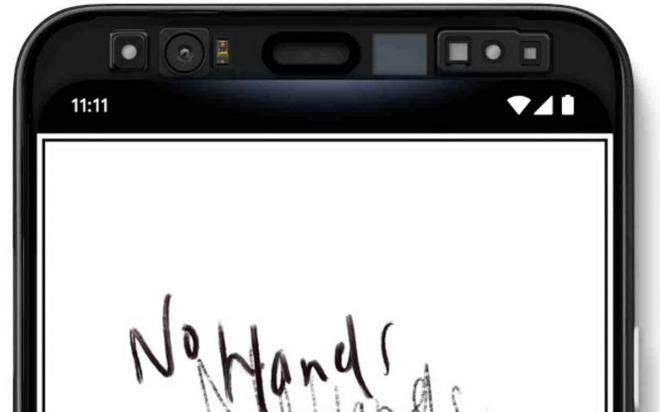Google's Pixel 4 phone implementing system similar to Apple's Face ID
Google on Monday previewed a pair of features coming to its Pixel 4 smartphone, including "Face Unlock," apparently directly competing with the Face ID technology on Apple's X-series iPhones.

Pixel 4 owners will be able to both unlock their device and authenticate payments with Face Unlock, Google said. The system relies on two IR cameras, a dot projector, a flood illuminator, and an ambient light and proximity sensor.
Significantly however it also includes a Soli radar chip, which will trigger facial recognition sensors as a person is still picking up the phone -- meaning that the device could potentially unlock faster than an iPhone.
The Soli chip is also employed in the second feature, Motion Sense, which will let people wave a hand in front of the phone for simple commands like snoozing alarms or silencing calls. Apple has occasionally explored non-touch gestures in patents, but has largely avoided them in shipping products outside of raise-to-wake.
Google confirmed plans for the Pixel 4 in June. It has yet to announce a release date, but Pixel phones are typically launched in October.
Android devices have mostly been unable to compete directly against Face ID, since the parts required for that level of facial recognition can be expensive to manufacture, leading to higher pricetags. In fact 2018's iPhone XR was the first iPhone below $999 to include Face ID, and still cost $749 -- $50 more than the iPhone 8 did in 2017.
Pixel 4 owners will be able to both unlock their device and authenticate payments with Face Unlock, Google said. The system relies on two IR cameras, a dot projector, a flood illuminator, and an ambient light and proximity sensor.
Significantly however it also includes a Soli radar chip, which will trigger facial recognition sensors as a person is still picking up the phone -- meaning that the device could potentially unlock faster than an iPhone.
The Soli chip is also employed in the second feature, Motion Sense, which will let people wave a hand in front of the phone for simple commands like snoozing alarms or silencing calls. Apple has occasionally explored non-touch gestures in patents, but has largely avoided them in shipping products outside of raise-to-wake.
Google confirmed plans for the Pixel 4 in June. It has yet to announce a release date, but Pixel phones are typically launched in October.
Android devices have mostly been unable to compete directly against Face ID, since the parts required for that level of facial recognition can be expensive to manufacture, leading to higher pricetags. In fact 2018's iPhone XR was the first iPhone below $999 to include Face ID, and still cost $749 -- $50 more than the iPhone 8 did in 2017.


Comments
I think the recent Apple commercial with the guy on the lounge chair raising to open his eye to have the phone unlock to see his text message is good example of how well it works.
It wouldn't be the first time.
assuming of course it all works as efficiently as intended.
Apple doesn't give a sh** about "oh that's cool", which is why these knockoffs fail when they TRY to innovate. Without Apple they're lost.
Remember wave-to-answer which Samsung thought was the future and iKnockoff Knights claimed was so "innovative" and "futuristic"?
Yeah, no one remembers. As usual, Androids failures get swept under the rug.
Then I thought about how many inadvertent interactions might take place when just normally reaching for stuff on the table. Anybody have direct experience with this? I haven't seen the feature advertised anymore.
Unless there is a good way to ignore inadvertent gestures, maybe not such a good idea.
/s
...and BTW Google announced it was working on this in 2015, and demoed it in 2016, three years before LG attempted a similar "air motion" feature.
https://www.androidcentral.com/what-can-soli-chip-bring-pixel-4
Both Motorola and HTC were in their twilights when Google bailed 'em out. Moto has gone on to see some success under new ownership while the future for HTC is pretty iffy. At least both were given a second life, not sure what they'll do with it.
People are always willing to reach back to some quirky irrelevant, failed feature on a knockoff and claim Apple copied it. lol
Apple does what they want. They ignore the noise.
This is why they're first in odd areas, seem to "improve" on an old idea and get things right on launch day. Because they've been working on something they believe in, not reactionary to crappy features.
For all the people bashing google for shameless imitation, there are plenty of areas where Apple has copied Android. The usual response in those cases is “Apple isn’t about being first, they’re about being the best,” or something to that effect. Why then is it ok for Apple to copy other companies, but not the other way around?
If Google wants to put a FaceID system on their phone, fine. Go ahead - I still won’t buy it.